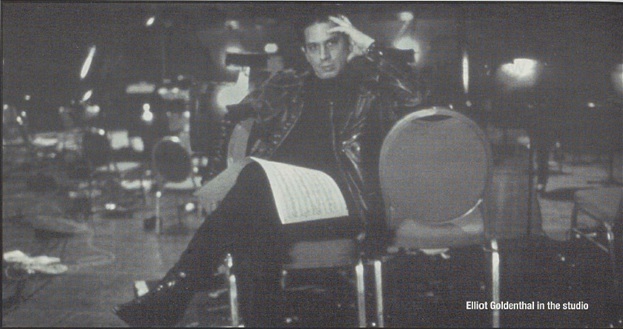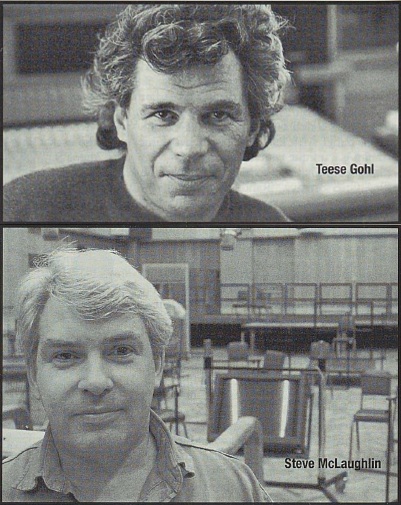

Creating the musical score for a movie seems like a fairly straightforward process involving only a phone call the right composer – say, Elliot Goldenthal, an A-list Hollywood composer whose credits include 1996's “Michael Collins” and 1995's “Heat” and “Batman Forever.”
But it's a bit more complex than that.
“You need someone to steer your boat,” says Goldenthal, who is working on two upcoming pictures: Julie Taymor's “Frida” and Neil Jordan's “The Good Thief.” “You can build the most incredible boat, but you need someone to steer it.”
In Goldenthal's case, two men who have carved a niche as film music producers – Teese Gohl and Steve McLaughlin – provide an indispensable service on two continents. Switzerland-born Gohl is based in New York, and Scotsman McLaughlin is based in London, but they have guided the boat for composers on a long list of major Hollywood pictures, including 1995's “Don Juan DeMarco,” 1993's “Demolition Man” and 1988's “Die Hard.”
Gohl and McLaughlin have worked on both of Goldenthal's upcoming pictures, and the classically trained New York-based composer says he cannot imagine working without them.
“As a film composer, let's say half your job is extramusical,” Goldenthal says. “There are so many extramusical things that come up that involve organizational skills, budgets, hiring specific musicians and politics. Those two fellows take care of that; it keeps me in the creative arena so that I don't get dragged down by 25 calls to fixers and studio owners and so on.”
Even more important, the composer says, is the producing duo's musical contribution.
“They're both very talented, and they have a tremendous influence,” he says. “Sometimes, people in the position of making the final decision, like myself, surround themselves with 'yes men.' I surround myself with 'no men'; they know that I'm not going to take 'yes' for an answer, that I respect their experience and musical talent to second-guess many of the ideas that I come up with. That keeps me extremely fresh, and it keeps my ears wide open.”
That has been the case, he says, with both of his new films. For “Frida,” Goldenthal wrote what he describes as “idiomatic Mexican-style music that is very human and extremely personal.” Salma Hayek stars in the film as famed Mexican painter Frida Kahlo, with Alfred Molina as her lover, painter Diego Rivera.
“It's a very intimate and personal score,” Goldenthal says. “Most of it is for solo guitar, but I also wrote some original songs.”
For “Thief,” which stars Nick Nolte in a remake of the 1955 French heist film “Bob le flambeur” (Bob the Gambler), Goldenthal took an approach that very much needed the talents of Gohl and McLaughlin. Goldenthal says it is different from any other film he has scored.
“I basically looked at the movie and then improvised the score into the computer based on my impressions of it, almost like an impressionist painter looking at an outdoor scene,” he says.
Goldenthal scored the entire picture that way, creating 20 experimental three-minute musical “impressions.” He had handpicked musicians perform controlled riffs and build the music layer by layer until, he says, “we had some extremely groundbreaking and fascinating material.”
Gohl and McLaughlin were on hand to steer the boat.
“They were my guides, editing along with the music editor, Michael Connell,” Goldenthal says.
But then they had to play the music for screenwriter-director Jordan, with whom Goldenthal has worked many times on such films as “Collins” and 1997's “The Butcher Boy.” Jordan was nervous.
“He got excited by the sounds and supported the idea, but he could not sanction it,” Goldenthal says.
So Goldenthal set out to write elements much more like those in a traditional score. Although he was disappointed at missing an opportunity to expose music he believed was fresh and exciting, he knew the director had the final say.
“You're working in collaboration, and it's not your own personal stage,” Goldenthal says. “Composers have ample opportunity to exhibit their work, and in this situation, you have to trust and be malleable. The score now is very well-crafted, very exciting and beautiful but not as jarring and unusual.”
It was not the first time Gohl and McLaughlin had tried something different in scoring – it was only the first time they had tried with an established A-list Hollywood film composer.
One of the key aspects of the Gohl/McLaughlin partnership involves working with artists who are new to film scoring, such as Rich Robinson of the Black Crowes on 2001's “Highway” and Dave Stewart, formerly of the Eurythmics, on 1994's “The Ref.” The most well-received result of this approach came this year while working with British artist Damon Gough – aka Badly Drawn Boy – on Universal/Working Tide's hit Hugh Grant comedy “About a Boy.” Nick Hornby, author of the novel on which the film is based, suggested Gough to the film's directors, Paul Weitz and Chris Weitz, just as they were going to mention his name.
“That's what I heard, anyway,” says Gough, who won Britain's top music award, the Mercury Prize, for his 2000 album “The Hour of Bewilderbeast.”
The indie rock singer-songwriter, who has a huge cult following in the United Kingdom and a growing one in the United States following his successful 2001 tour, says he leaped at the chance to make music for a film and immediately commenced writing.
“I was happy; I was writing songs, and they were shaping up quite well,” Gough says. “I thought, ‘We'll just record the songs and give them to the people at Universal, and they'll find a way of putting them in the film.’ All I can say is this: The gods were on my side because Steve McLaughlin was there working with me.”
Working Tide music supervisor Nick Angel says “Boy” co-producer Nicky Kentish Barnes suggested bringing in McLaughlin.
“We needed to put Damon in a safe pair of hands,” Angel says. “Steve was brilliant because he made it happen. He totally knows how to deal with artists and what they're thinking; he has a strong and very accurate nose for what is right. Damon's creativity married to Steve's steering wheel, and every time we went down, it was going the right way.”
McLaughlin says the blunt realities of film music often take artists by surprise.
“For the artist, he makes the music he makes, and that's it,” he says. “We have to show that now there's this new guy – he's called the director – and you've got to be in a band with him. It's only for a few weeks, and it won't be too bad, but at first you're not going to speak each other's language.”
Universal executives still had to be convinced, and there were some bumps in the road before Badly Drawn Boy's songs and musical score were indivisibly a part of “Boy”.
Gohl and McLaughlin see their process as a way for more films to benefit from bringing in artists from other fields.
“This is a way for filmmakers to work with exciting artists who aren't familiar with the demands of film,” McLaughlin says. “Nick Hornby gave an interview in which he said he loved the soundtrack; he said it showed that film companies can be adventurous and still make a commercial movie. I think he's right.”
